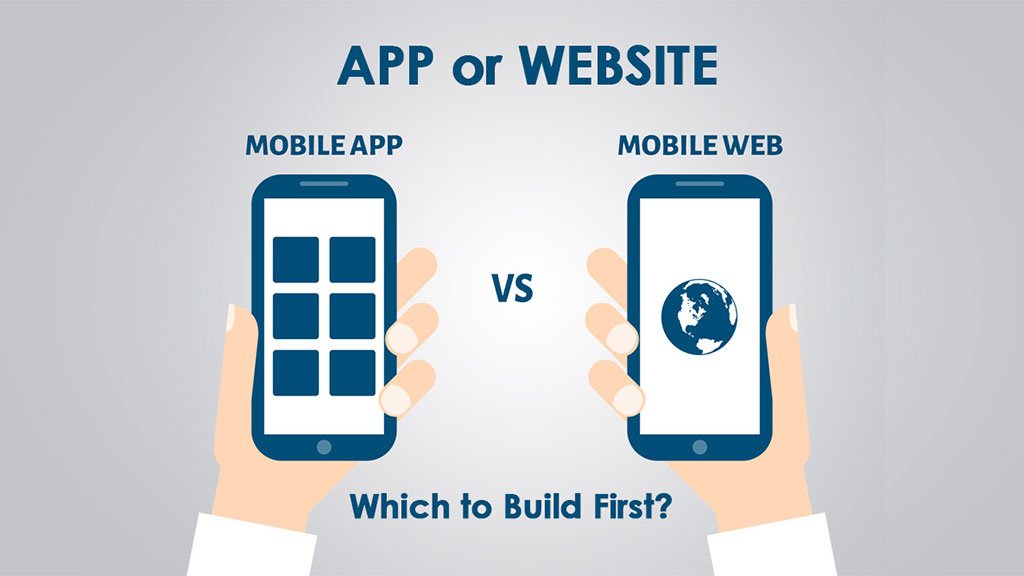Which one is better for your Business? Find out Now!
One of the biggest questions that all new business owners face is, “Should I build a mobile-friendly website or a mobile app first?” Of late, this issue has seen more debates than the other notorious one, “Which came first – the chicken or the egg?”
Mobile apps are so popular these days that many start-ups are even skipping website development to focus on creating a native app. But is this route the right one? Will it help you sustain your business growth in the long run?
Find out the answers to all these questions and much more in this article. Here, we help you explore the pros and cons of both the mobile app and a responsive website and give you the right guidance to help you make the best decision.
It’s Time to Get the Basics Right
What’s a Mobile Website?
It’s a site that is visited by a customer using a browser on a Smartphone. One of the biggest differences between a mobile website and a desktop one is that the former is responsive. Meaning a mobile site provides the user with a mobile-friendly view. The pictures, navigation, layout, and content are altered to suit all screen sizes, providing the user with an enhanced interactive experience.
What’s a Native Mobile App?
Simply put, it’s an app that has been designed for a mobile OS. You download it from Google Play for Android and the App Store for iOS. They are termed “Native” because they are native to the mobile OS and are following the general guidelines for the device.
Now, that you’re aware of the terminologies, we come to the big question, “Should you invest in an app or mobile-friendly website or both?”
No one answer suits all businesses. Instead, we help you arrive at the right decision by listing out the pros and cons of both.
The Top Advantages of a Mobile-Friendly Website
YOUR MOBILE SITE IS THE VISITING CARD FOR YOUR BUSINESS
Mobile-friendly sites are pretty powerful tools. Studies reveal that out of the six hours a customer spends on the internet every day, 51% of the time is one mobile, 42% on laptops/desktops, and 7% on tablets.
Also, the first interaction for many customers, with a new business occurs on a mobile site. This makes it highly crucial for you to get the first impression right.
Consider your mobile website as the new business card of the digital age. If they like what they see on your site, they are likely to build a relationship with your business.
MOBILE SITES ARE EASY TO ACCESS
It’s often hassle-free to access a mobile-friendly site. You have to click on the URL from Google search or just type it in the browser, and you can reach the site instantly (typically within three seconds).
On the other hand, to use a native mobile app, the customer first has to locate it in the App/Play store (this is quite challenging) and then download it, before they can use it. Also, most customers are reluctant to give space for a new mobile app, that they haven’t heard of before.
So, if you have a robust mobile site, which has won the trust of the users, you can then drive traffic to your app from your site.
UPDATES ARE AVAILABLE TO ALL USERS AND DO NOT REQUIRE APPROVALS
This is one of the biggest draws of a mobile app. Any update you provide is instantly available to all users, without any effort from their side. You are in full control of the time and schedule of the upgrade. And, even if something goes wrong, you can roll back the release without affecting any of your users.
This isn’t possible with apps. The process is complicated and takes time for updates.
YOUR BUSINESS MAY NOT NEED A NATIVE APP AT ALL
Let’s look at this with the help of an illustration. How do you search for a plumber in your neighborhood? We’re pretty sure that you google plumbers in your area and pick the one who is near to you.
In this case, a mobile-friendly site that is SEO and local search are all that is needed to reach the target customers. The native mobile app doesn’t play any role here.
Ultimately, it all depends on the nature of your business.
YOU NEEDN’T BOTHER YOURSELF WITH PLATFORM-SPECIFIC CONTROLS AND USER EXPERIENCE
When you build a mobile site, you just focus on creating one UI that appeals to all users across a variety of devices. You need not worry about the different user guidelines for Android, iOS, Windows, or Blackberry users.
All users irrespective of their mobile OS see a consistent view of your site. This saves both money and time.
CHEAPER WHEN COMPARED TO NATIVE MOBILE APPS
Building a decent app is expensive. So, if you’re a startup that has limited funds, instead of embarrassing your business with a poorly designed app, opt for a mobile website for a lower cost. Once you have built a steady revenue stream, you can then provide your customers with an efficient mobile app.
In spite of all these advantages, we believe that native apps are essential for your business to succeed in the long run.
There’s no denying the fact that mobile websites are often the first point of interaction for most of your customers. So, you must ensure that you get it damn good. However, a mobile website is no match for the levels of engagement and revenue provided by native mobile apps.
“While a number of visitors hit a Mobile Website, visitors spend more time on Mobile Apps.”
Top Reasons to Build a Native Mobile App
INCREASED USER ENGAGEMENT
The time users spend on an app is 18 times more than that of mobile websites. Since an app is present on the customer’s smartphone, they can access it anytime without any hassle. Apps help customers perform a particular task. For instance, if you’re an e-commerce store, then your app makes it easy for the customer to shop and check out when compared to a mobile site.
Also, it’s easy for apps to talk (notify) with the users. You can send notifications about an ongoing sale and motivate your client to purchase at your store. This is one of the biggest benefits of mobile apps. They regularly interact and engage with the customer, which is missing in mobile sites.
EXCEPTIONAL USER EXPERIENCE
There’s no point in arguing this one. An app is built using the specific controls of the platform. This provides users with an experience that they are familiar with and thereby making it easy to use.
BEST PERFORMANCE
We would like to illustrate this with an example. Facebook now is entirely native. However, this wasn’t so earlier. In fact, Mark Zuckerberg in an interview stated that the biggest mistake of the company was relying on HTML5 instead of going native.
Native mobile apps provide the best experience and performance for the user. This can be explained simply as,
“Native apps talk directly to the OS. On the other hand, mobile sites speak with the browser which in turn interacts with the OS.”
So, the performance of mobile apps cannot be beaten.
PERSONALISATION IS EASY WITH MOBILE APPS
When users download your mobile app, they provide you with their credentials. This helps you to provide the most relevant data to the end-user. You can create target customer groups and reach out to them quickly with the aid of push notifications.
NO NEED FOR A LOGIN
Have you ever abandoned your shopping cart at the last minute because the site asks you to register? In fact, studies state that more than 22% of customers abandon their purchases because they don’t want to register on a site.
A native mobile app overcomes this issue. If you get the customer to log in once, he/she is logged in forever.
A MOBILE WEBSITE AND APP AREN’T MUTUALLY EXCLUSIVE
Just because you are focussing on your app, doesn’t mean that you can skip building a website and vice versa. The mobile site acts as an introduction to your service. It covers the What and Why’s of your business. Additionally, a mobile website is essential to boost your SEO and to draw in customers in the first place. This is vital if you’re just getting started. You need to spread word of mouth about your business, and this is possible only when you have an efficient mobile site.
To put it in a simple way, “Mobile websites are essential to reach prospective customers, whereas native mobile apps optimize the experience of current users.”
Since both mobile websites and apps serve two different goals and target two different groups of audiences, it doesn’t make sense to prefer one over another.
The solution: Establish a good mobile presence and then improve user engagement by providing them with a great native mobile app.
WRAPPING IT UP
From experience gained over the years in handling businesses of different sizes and nature, we at WebFries, a leading mobile app maker and website development company in Gurgaon, believe that the best strategy is to build a mobile-friendly aka responsive site first. This helps you to iron out the kinks in your business process. Once you have done this, you can then focus your resources on building an exceptional mobile app.
Whether you’re looking to build a native mobile app from scratch or building a mobile-friendly website, you’ve come to the right place. We at WebFries, a top-notch website and Android development company in Gurgaon are here to help your business scale new heights. Just give us a ring at +91 124-4379-633 to kick start your project.


